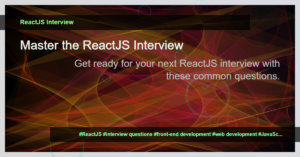Introduction:
When preparing for a JavaScript interview, it is crucial to have a solid understanding of the language and be able to showcase your skills and problem-solving abilities. In this article, we will cover some frequently asked JavaScript interview questions and provide detailed explanations along with example answers.
1. What is JavaScript and how does it differ from Java?
JavaScript is a high-level, interpreted programming language primarily used for adding interactivity and dynamic behavior to websites. It is often embedded directly into HTML pages and runs on the client-side. On the other hand, Java is a general-purpose programming language that runs on the server-side and can also be used for developing desktop and mobile applications. Despite their similar names, JavaScript and Java are completely different languages with different use cases.
Example answer:
JavaScript is a scripting language that enables interactive elements and dynamic content on webpages. It is primarily used for client-side scripting, allowing developers to create responsive and interactive user interfaces. On the other hand, Java is a versatile programming language used for a wide range of applications, including web development, desktop software, and mobile app development. While JavaScript and Java have similar names, they have distinct syntaxes, purposes, and runtime environments.
2. Explain the difference between var, let, and const in JavaScript.
In JavaScript, variables can be declared using three keywords: var, let, and const. Understanding the differences between them is crucial for writing clean, maintainable code.
Example answer:
varis function-scoped and can be redeclared and reassigned. Its scope is not limited to the block it is defined in.letis block-scoped and can be reassigned but cannot be redeclared within the same scope. It is commonly used when you need to reassign a variable or limit its scope to a specific block.constis also block-scoped but cannot be reassigned or redeclared. It is used for declaring constants that should not be changed throughout the program.
3. What are closures in JavaScript?
Closures are an important concept in JavaScript that allows functions to maintain access to variables from their outer (enclosing) function scopes, even after the outer function has finished executing.
Example answer:
In JavaScript, closures are created when a function is defined within another function. The inner function has access to variables and scope of the outer function, even after the outer function has completed execution. This allows for a powerful programming pattern where variables can be shared between multiple functions without polluting the global scope. Closures are commonly used for creating private variables, currying functions, and implementing data hiding.
4. Explain event delegation in JavaScript.
Event delegation is a technique in JavaScript where instead of binding an event to each individual element, the event is bound to a common ancestor element. This allows you to handle events for multiple elements with a single event listener.
Example answer:
Event delegation is a technique used in JavaScript to handle events more efficiently. Rather than attaching an event listener to each individual element, an event listener is attached to a parent or ancestor element. When an event occurs, instead of directly targeting the element, the event is propagated and handled by the ancestor element. This approach is particularly useful when dynamically adding/removing elements or when you have a large number of elements to handle. It improves performance by reducing the number of event listeners and simplifying event management.
Conclusion:
Preparing for a JavaScript interview can be challenging, but with a solid understanding of the language fundamentals and the ability to effectively answer common interview questions, you can confidently showcase your skills and increase your chances of landing your dream job. Remember to practice implementing the concepts discussed here and to tailor your answers to your own experiences and projects. Best of luck with your JavaScript interview preparation!




